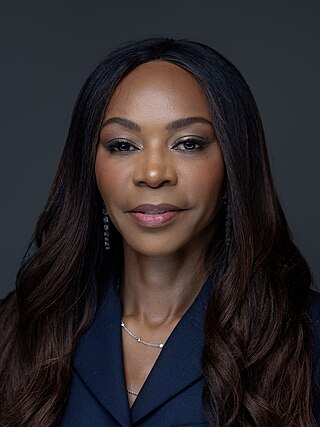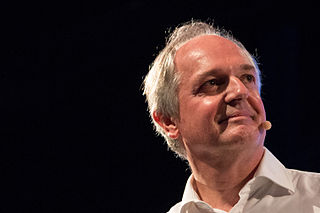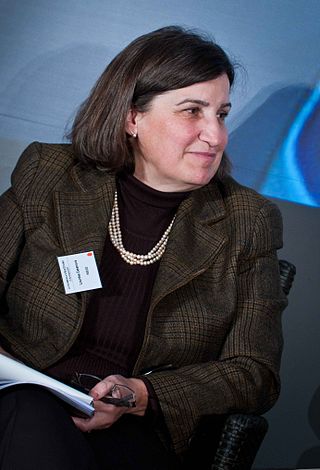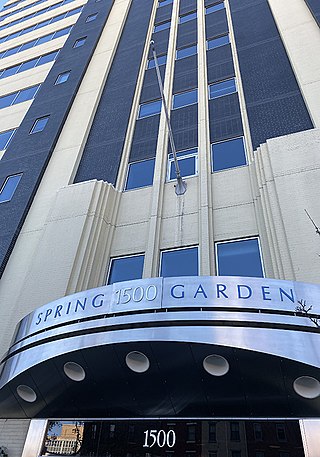
Bruegel is a think tank devoted to policy research on economic issues. Based in Brussels, it launched its operations in 2005 and currently conducts research in five different focus areas with the aim of improving economic debate and policy-making.

Bloomberg L.P. is an American privately held financial, software, data, and media company headquartered in Midtown Manhattan, New York City. It was co-founded by Michael Bloomberg in 1981, with Thomas Secunda, Duncan MacMillan, Charles Zegar, and a 12% ownership investment by Bank of America through its brokerage subsidiary Merrill Lynch.
An emerging market is a market that has some characteristics of a developed market, but does not fully meet its standards. This includes markets that may become developed markets in the future or were in the past. The term "frontier market" is used for developing countries with smaller, riskier, or more illiquid capital markets than "emerging". As of 2006, the economies of China and India are considered to be the largest emerging markets. According to The Economist, many people find the term outdated, but no new term has gained traction. Emerging market hedge fund capital reached a record new level in the first quarter of 2011 of $121 billion. Emerging market economies’ share of global PPP-adjusted GDP has risen from 27 percent in 1960 to around 53 percent by 2013. The ten largest emerging economies by nominal GDP are 4 of the 9 BRICS countries along with Mexico, South Korea, Indonesia, Turkey, Saudi Arabia, and Poland. The inclusion of South Korea, Poland, and sometimes Taiwan are questionable given they are no longer considered emerging markets by the IMF and World Bank If we ignore those three, the top ten would include Argentina and Thailand.
MDPI is a publisher of open-access scientific journals. It publishes over 390 peer-reviewed, open access journals. MDPI is among the largest publishers in the world in terms of journal article output, and is the largest publisher of open access articles.

Dambisa Felicia Moyo, Baroness Moyo is a Zambian-born economist and author, known for her analysis of macroeconomics and global affairs. She has written five books, including four New York Times bestsellers: Dead Aid: Why Aid Is Not Working and How There Is a Better Way for Africa (2009), How the West Was Lost: Fifty Years of Economic Folly – And the Stark Choices that Lie Ahead (2011), Winner Take All: China's Race for Resources and What It Means for the World (2012), Edge of Chaos: Why Democracy Is Failing to Deliver Economic Growth – and How to Fix It (2018), and How Boards Work: And How They Can Work Better in a Chaotic World (2021).
The Financial Stability Board (FSB) is an international body that monitors and makes recommendations about the global financial system. It was established in the 2009 G20 Pittsburgh Summit as a successor to the Financial Stability Forum (FSF). The Board includes all G20 major economies, FSF members, and the European Commission. Hosted and funded by the Bank for International Settlements, the board is based in Basel, Switzerland, and is established as a not-for-profit association under Swiss law.

Paulus Gerardus Josephus Maria Polman, is a Dutch businessman and author. He was the chief executive officer (CEO) of the British/Dutch consumer goods company Unilever. Polman is also the co-author of Net Positive: How Courageous Companies Thrive by Giving More Than They Take.
The Indian Historical Review is a peer-reviewed academic journal published bi-annually in association with the Indian Council of Historical Research.

Lourdes S. Casanova is an academic, author and currently a Senior Lecturer of Management at the Samuel Curtis Johnson Graduate School of Management and Gail and Rob Cañizares Director of the Emerging Markets Institute. Before her appointment to Johnson School, Casanova was a lecturer in the Strategy Department at INSEAD. She specializes in international business with a focus on Latin America and multinationals from emerging markets. In 2014 and 2015, Lourdes Casanova was appointed as one of the 50 most influential Iberoamerican intellectuals by Esglobal. Also, she is member of the Board of Directors of Boyce Thompson Institute.

The Organisation for Economic Co-operation and Development is an intergovernmental organization with 38 member countries, founded in 1961 to stimulate economic progress and world trade. It is a forum whose member countries describe themselves as committed to democracy and the market economy, providing a platform to compare policy experiences, seek answers to common problems, identify good practices, and coordinate domestic and international policies of its members.
The Journal of Human Values provides an understanding of how in order for individuals, organizations and societies to endure and function effectively, it is essential that an individual's positive exalting forces be rediscovered and revitalized. It provides an international forum for the exchange of ideas, principles and processes concerning the application of human values to organizations, institutions and the world at large. It addresses the historico-social origins and the cross-fertilization between culture since many operational human values are clearly culture-specific.
Frontiers Media SA is a publisher of peer-reviewed, open access, scientific journals currently active in science, technology, and medicine. It was founded in 2007 by Kamila and Henry Markram. Frontiers is based in Lausanne, Switzerland, with offices in the United Kingdom, Spain, and China. In 2022, Frontiers employed more than 1,400 people, across 14 countries. All Frontiers journals are published under a Creative Commons Attribution License.

The Global Business Review is a peer-reviewed academic journal covering all aspects of management. Global Business Review is published once in two months (Bi-monthly) by International Management Institute in association with SAGE Publications. It is edited by Professor Kakali Kanjilal.
The China Report is a refereed academic journal published by SAGE Publications, India four times a year in association with the Institute of Chinese Studies. It is edited by Sreemati Chakrabarti.
India Quarterly is a peer-reviewed journal published quarterly by Sage in association with Indian Council of World Affairs.
The Journal of Education for Sustainable Development is a forum for discussion and dialogues in the emerging field of Education for Sustainable Development (ESD). The journal is published by Sage Publications India Pvt Ltd, India in association with the Centre for Environment Education.
The Journal of Creative Communications is published three times a year by SAGE Publications in collaboration with MICA, Shela, Ahmedabad, India. It is an international double-blind peer-reviewed journal.
The IIM Kozhikode Society & Management Review is a double-blind peer-reviewed journal. It is published twice a year by SAGE Publications in association with Indian Institute of Management Kozhikode.
The Journal of Developing Societies is a refereed international journal on development and social change not only in 'developing' countries but also the 'developed' societies of the world. It provides an interdisciplinary forum for the publication of theoretical perspectives, research findings, case studies, policy analyses and normative critiques on the issues, problems and policies of both mainstream and alternative approaches to development.

Clarivate Plc is a British-American publicly traded analytics company that operates a collection of subscription-based services, in the areas of bibliometrics and scientometrics; business / market intelligence, and competitive profiling for pharmacy and biotech, patents, and regulatory compliance; trademark protection, and domain and brand protection. In the academy and the scientific community, Clarivate is known for being the company that calculates the impact factor, using data from its Web of Science product family, that also includes services/applications such as Publons, EndNote, EndNote Click, and ScholarOne. Its other product families are Cortellis, DRG, CPA Global, Derwent, CompuMark, and Darts-ip, and also the various ProQuest products and services.






